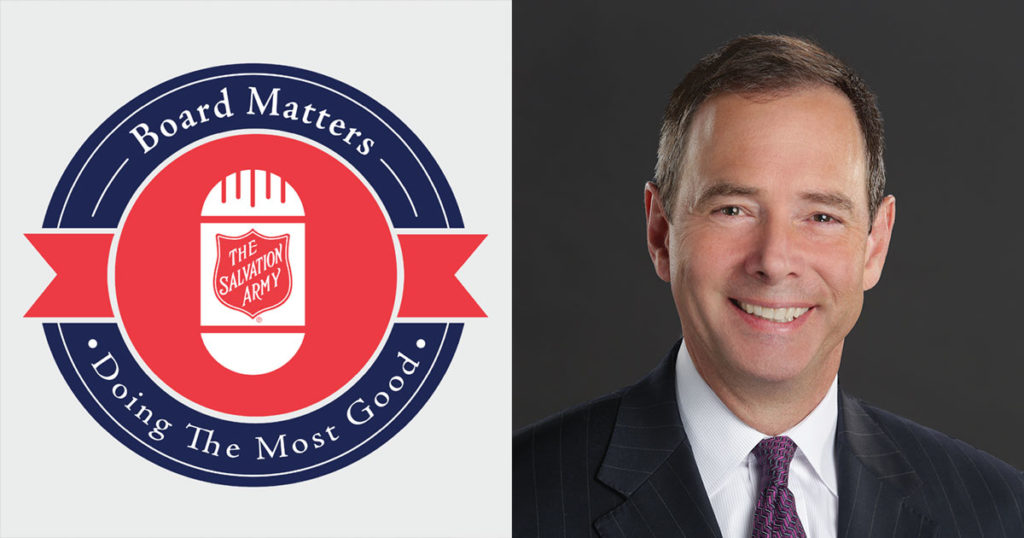Torrey Foster
"People follow leaders who live out their values and follow through on what they say. That kind of authenticity and integrity builds trust."
Torrey Foster, Vice Chairman and Managing Partner at Korn Ferry, joined Dale Bannon on the “Board Matters” podcast to talk about his service on The Salvation Army’s National Advisory Board (NAB), recruitment in the workplace, managing teams and more. Read excerpts from their conversation here and listen to “Board Matters” wherever you get your podcasts.
Dale Bannon: Torrey, what brought you to the Salvation Army?
Torrey Foster: It really was an answer to prayer. I had been praying about finding a service opportunity that would complement both my professional and family life. That opportunity came through a former colleague and dear friend, Dale Jones, who previously served on the National Advisory Board. He reached out and said, “Hey Torrey, we haven’t talked in a while, but we’re looking for someone like you for the national board.”
Dale and I had been part of a men’s Christian fellowship group at our firm back in the 2000s, so he knew my faith background. It truly felt like an answer to prayer. And as they say, the rest is history.
Bannon: Faith at work is something people often avoid discussing. Why is important to you?
Foster: You have to live who you are. In today’s world, it can sometimes feel taboo to talk about your faith in the workplace. But people — especially those you lead — are always observing you. They’re curious about your inner code and your guiding principles.
In my case, just being associated with The Salvation Army for the past seven-plus years has sparked many conversations. Colleagues will ask, “Torrey, tell me more about that. I know a bit about The Salvation Army, but what do they really do?” That opens the door to talk about what’s meaningful to me, without forcing anything on anyone. It becomes an invitation rather than a directive.
Bannon: With over 25 years in leadership experience, what have you discovered to be a common characteristic of leaders that sets them apart?
Foster: It starts with a compelling vision — something people can align with — but it really comes to life through followership. Great leaders create followership throughout their organizations, not just from those who report directly to them.
The old saying, “I can’t hear what you’re saying because I’m too busy watching what you’re doing,” is very true. People follow leaders who live out their values and follow through on what they say. That kind of authenticity and integrity builds trust. With that trust, you can accomplish extraordinary things, whether you’re in a nonprofit or for-profit setting.
Bannon: How can someone further along in their career help mentor a younger coworker?
Foster: It takes intentional engagement. You need to establish structured mentorship or development relationships, whether one-on-one or in groups. And you have to formalize it.
That might mean choosing specific days when you’re in the office to ensure face time. Maybe you plan to have lunch together or attend meetings side by side. If you’re remote, it could mean setting up a regular Zoom call that focuses solely on development — not on day-to-day tasks.
You also have to be reachable. My team knows that when I’m working virtually, they can ping me anytime. If I’m tied up, I’ll respond and let them know I’ll follow up in 10 or 30 minutes. You have to recreate that open-door dynamic in a virtual environment, like when someone walks by your office and pops in.
Bannon: You serve in the National Advisory Board Nominating Committee, what kind of individuals is the NAB looking for?
Foster: We’re looking for a broad range of skills and experiences — business leadership, philanthropy, government relations, international engagement, Christian media, and faith-based networks across denominations.
Every year, we assess the board’s composition because it’s a living, evolving body. As members complete their terms, we look to fill those gaps while maintaining a strong balance of expertise and diversity.
Joining the National Board often starts without you even knowing you’re being considered. But if you’re on a local advisory board and interested in serving nationally, make that interest known. Let your local command or division know. That information eventually makes its way to the territorial level, and the territories make recommendations to the National Board.
It’s not just about expressing interest — it’s about having an impact. If you’ve led a capital campaign, grown a program, or helped drive significant local results, those accomplishments stand out. We look for people who have made a meaningful difference and can bring that same energy and insight to the national level.
Bannon: Anything specifically I can pray for you today?
Foster: I’ll just continue to pray for the work of the Army, especially that generous hearts would be circling around all the red kettles this holiday season and that people would be generous so that the work of the Army can continue and expand.
Listen to the full conversation on Board Matters — available wherever you get your podcasts.







